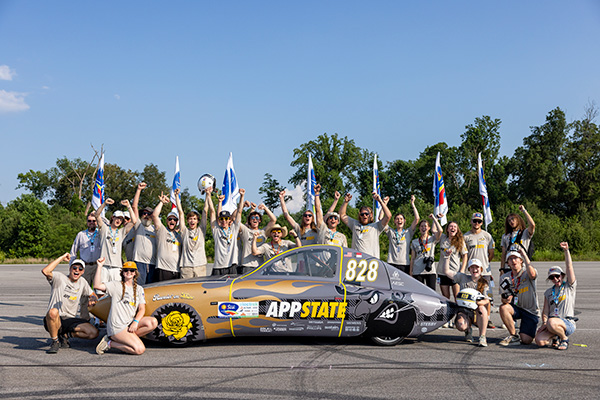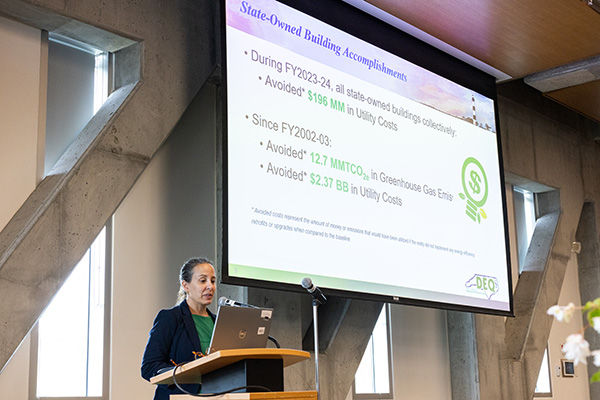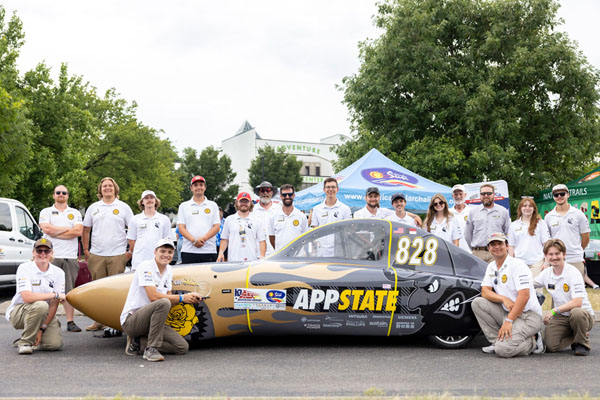Message from the Chief Sustainability Officer: Continued commitment to sustainability and resilience
Dear App State Community,
With spring semester underway, our universitywide sustainability and resilience initiatives continue to build on our successes, driven by our faculty, staff and students. A special thank-you to the dedicated faculty, staff and students who are helping create and implement the vision for sustainability on our campus and in our community.
With Chancellor Sheri Everts’ support and guidance from the Office of Sustainability — one of the first established at an institution of higher learning — the principles of sustainable action are deeply interwoven in our curricula, campus facilities and grounds, community engagement and day-to-day practices.
As Chief Sustainability Officer, I am pleased to provide the progress report below, which is the first of quarterly campus updates to come.
Academics
With the passing of the best budget in recent App State history, Chancellor Everts announced we will soon break ground on the first building in our new Innovation District: the Conservatory for Biodiversity Education and Research. App State faculty have developed an extensive collection of course content focused on climate change impacts and solutions. Several departments are offering a Climate Responses and Response-Ability course — tailored to their students’ field of study — during the 2021–22 academic year. Our annual Sustainability Film Series kicked off Jan. 25, and we are pleased we will co-host the virtual 2022 Southeastern Student Sustainability Conference with the University of South Carolina.
Climate action
App State’s Climate Action Plan is serving as a roadmap to guide the university toward climate neutrality, and our Mitigation Strategy Assessment Tool tracks each of the plan’s 81 mitigation strategies. In November 2021, along with App State’s Dr. Dave McEvoy, professor in and chair of the Department of Economics, and Dr. Martin Meznar, associate dean of global and civic engagement in the Walker College of Business, I represented App State at the 26th annual United Nations Climate Change Conference in Glasgow, Scotland. We are working to include our students in future conferences and are exploring ways App State can employ this significant global platform to address the threats of climate change and build resilience.
This Friday, Feb. 11, from 10 a.m.-noon, the Office of Sustainability will host a Campus Sustainability Forum in Room 137C, Plemmons Student Union. During this meeting, staff from the Office of Sustainability will share updates from the latest campus sustainability report compiled by the office and others across campus, followed by a question and answer session. I hope you can join us.
Engagement and service
As part of our ongoing efforts to support climate action and encourage institution and behavior change, the GreenSuite collection of programs helps all Mountaineers easily incorporate sustainable practices into our daily lives. Our Mountaineer Food Hub and Free Store continues to be a helpful resource, with six satellite locations throughout campus and two additional locations forthcoming. In the fall 2021 semester, approximately 3,000 meals — as well as personal care items — were donated to Mountaineers. Fresh produce from our three campus gardens help supply the Food Hub and also offer educational and outreach opportunities for upwards of 100 students each year. Our 20 Sustainability Ambassadors and five Zero Waste Ambassadors develop and host education events, and create videos and social media posts to help build awareness and engage with others on sustainability issues.
Food, dining and waste
The Office of Sustainability works closely with Campus Dining to manage sustainable initiatives such as the Skip the Bag program, and we maintain a list of dining products and ingredients that are typically purchased locally and/or sustainably. We remain committed to our zero waste initiatives and we installed composting stations on campus. A recent example of our work toward reducing waste: We were able to recycle 4,200 pounds of waste after the Luke Combs concert in September 2021.Though the COVID-19 pandemic necessitated a return to Styrofoam to-go containers for a brief period of time for both financial and health and safety reasons, we have returned to using more sustainable takeaway containers. Campus Dining offers a selection of plant-based dining options, and we remain committed to finding opportunities to avoid single-use cutlery.
Infrastructure
In App State’s campus construction projects, we are cognizant of opportunities to be more sustainable. Many of our buildings are LEED-certified and our newest residence halls follow Green Built Alliance standards. We will perform a sustainability audit for the App State Hickory Campus building to assess energy and efficiency needs, as well as opportunities to advance the university’s sustainability mission. We are transitioning our campus to LED lighting in all buildings and since 2020 we have completed LED upgrades throughout D.D. Dougherty Hall, portions of the Rankin Science Building and the academic wing of the Living Learning Center. Lighting upgrades in Holmes Convocation Center are underway — once completed they will reduce the building’s total electrical consumption by 13%, or more than 300,000 kilowatts per year. The construction of our new residence halls has also allowed us to add green space on campus and we maintain more than 900 acres of land that serve as a carbon sink — within our Teaching and Research Farm and Nature Preserve, and throughout the High Country.
Purchasing
We are committed and actively working to improve the university’s sustainable purchasing practices. Our textbook rental program operates primarily through digital versions of books and class materials — saving students hundreds of dollars over the course of their academic careers. Our GreenPurchasing program, part of GreenSuite, provides information about how to purchase more sustainably. We are also actively working to support more local businesses — including those owned by women and by people who identify as being from underrepresented populations — which is in line with statewide efforts to promote economic opportunities for historically underutilized businesses.
Renewable energy
App State’s electric utility, New River Light and Power, has begun purchasing its electricity from Carolina Power Partners, giving the university and NRLP new options for purchasing carbon-free electricity. Additionally, as Chancellor Everts announced in November 2021, we are working on an agreement with Blue Ridge Energy that will convert the purchased electricity for Levine Hall to 100% solar this year, which will increase our total purchased electricity to 18% renewables, and we are looking for other opportunities to move additional facilities to solar in the future. I would like to thank App State’s student-led Renewable Energy Initiative (REI) for helping make this increase in renewables possible through their funding support.
Research
Across our campus, App State faculty, staff and students are engaging in important research every day. Four examples include:
- Dr. Sarah Evans, assistant professor in the Department of Geological and Environmental Sciences, and her undergraduate students are studying water saturation patterns in Alaska’s thawing permafrost to provide new insights on the advancement of climate change.
- Dr. Baker Perry, professor in the Department of Geography and Planning and one of the world’s top experts in high altitude precipitation and climate change, is helping our students conduct hands-on research in the field of climate science.
- App State was one of five universities in the country selected by AT&T to conduct research designed to help communities in the southeastern United States build resilience to climate change. Dr. Tammy Kowalczyk, professor in the Department of Accounting and director of App State’s Impact Clinic, was the leader on this project.
- A research team, led by Dr. Rahman Tashakkori, the Lowe's Distinguished Professor of Computer Science and chair of the Department of Computer Science, is helping to address the decline of honeybee populations through a nearly $1.1 million grant through the University of North Carolina System’s Research Opportunities Initiative.
Strategic planning
Throughout the pandemic, the university’s Bridge Strategic Plan has ensured our priorities have remained steadfast, and as we look to the future, I am proud to chair a large and diverse strategic planning team. We are currently writing the university’s next strategic plan, for which our longstanding priorities of sustainability and resilience remain a foundation. As Chancellor Everts reported to the university’s Board of Trustees in December 2021, the University Planning and Priorities Council (UPPC) has been holding listening sessions with campus and meeting with key constituency groups, including the Faculty Senate Executive Committee. The UPPC is using the feedback from these sessions to inform the initial drafts of the plan, and will again seek feedback from campus prior to presenting the plan to Chancellor Everts, then the Board of Trustees, for final approval in June. Thank you to Provost Norris for recognizing the members of the UPPC at Friday’s annual Spring Faculty and Staff meeting, and for encouraging continued feedback for the plan.
Transportation
At the end of the fall semester, the university installed new electric car charging stations in the Legends parking lot. App State’s first fully electric Parking and Transportation vehicle is in operation, and through a collaboration of AppalCART and App State, AppalCART received more than $1 million in grant funds toward the purchase of an electric bus and charging station, which will potentially come online this summer. Funds raised through the Carbon Neutral Commuter program go toward the purchase of offsets and support our climate action goals — since its establishment in 2014, 6,852 Mountaineers have participated in the program, helping eliminate about 15,000 tons of carbon. Join the effort and offset your commute carbon footprint today! Team Sunergy, our solar vehicle team, is the all-star of sustainable transportation at App State. Last summer, the team won first place in the 2021 American Solar Challenge and second place in the 2021 Formula Sun Grand Prix. The team’s trophies have arrived at App State, and we are preparing to defend our champion title in the 2022 race.
Water and energy savings
App State purchases renewably generated electricity and actively works to reduce the campus’s total amount of required energy. In fall 2020, the Appalachian Energy Summit — a three-day, annual event envisioned and hosted by App State — reported that UNC System institutions, together with industry partners, have saved North Carolina more than $1 billion in avoided energy costs between 2002–19. App State’s proportion of these savings was $30,376,000. The expectation is the System will realize $2 billion in avoided costs by 2025. We completed an environmental restoration on the Middle Fork of the New River and have received funding through the FY 2021–22 biennial budget bill signed into law by Gov. Roy Cooper in November 2021 that will allow us to initiate work to begin the planning for the daylighting of Boone Creek. From 2002–03 to 2020–21, App State has avoided more than $35 million in energy and water costs.
We are proud of our accomplishments, passionate about our ongoing sustainability initiatives, and driven to build upon our progress and continually improve. I encourage the App State Community to continue to be part of our progress by engaging in the university’s GreenSuite programs and getting involved on campus and in the local community. Individually and collectively, we can make real and powerful differences for our campus today, and in the future.
Sincerely,

Dr. Lee F. Ball
Chief Sustainability Officer



